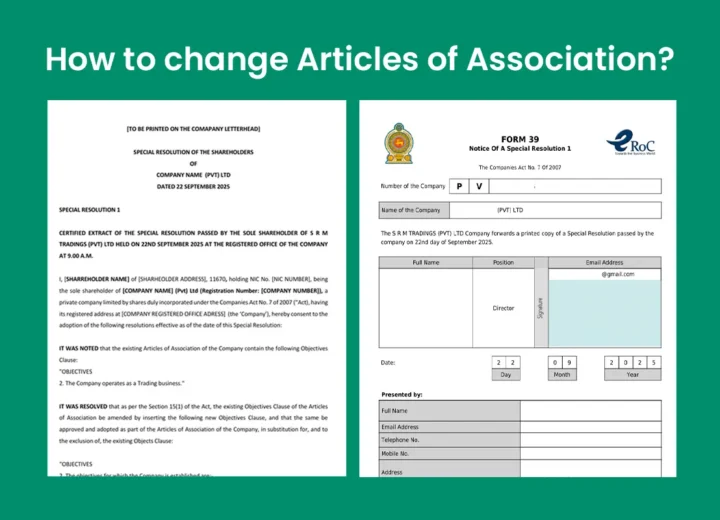10 Steps to Pvt Ltd Company Registration Sri Lanka
Are you thinking about converting your existing sole proprietorship or partnership business to a Pvt Ltd company? Or starting a new business as a Private Limited?
Pvt Ltd company registration Sri Lanka is now easier than ever. The entire registration process can now be completed online via the eROC Sri Lanka website. This means you no longer need to visit the Department of Registrar of Companies (also known as the Samagam Madura) to submit Pvt Ltd company registration Sri Lanka forms or receive your company incorporation certificate.
In this blog post we will explain how to register a Pvt Ltd company in Sri Lanka online via the eROC website in 10 simple steps.
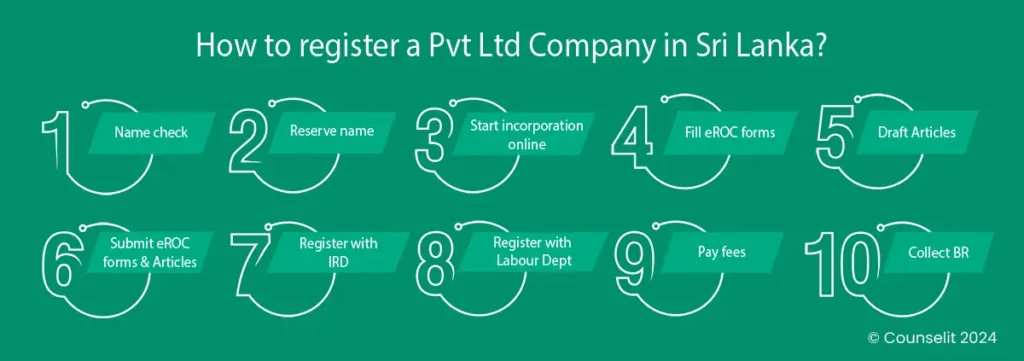
Table of Contents
1. Company registration Sri Lanka name check
The first step in registering a Pvt Ltd company in Sri Lanka is to reserve your desired company name. You can easily check if your company name is available by visiting the eROC Sri Lanka home page.
When you visit the eROC website, you’ll be directed to a menu where you can search for existing company names. You can search by typing part of the company name—choose either the “Begins with” or “Contains” option—or enter the full company name.
You don’t need to log in to use the system. Anyone can perform a search.
Just type your desired company name into the search bar, and if it’s available, you’re good to go!

2. Submit your Name Reservation Application
To reserve your company name, you’ll need to register an account with the eROC website. First, create an account under ‘I’m a Third Party’.
Once you log in to your account dashboard, click on the Name Reservation Option. The system will then prompt you to enter your desired company name. Before doing that, make sure to select the type of company as Private Limited from the dropdown menu.
Note: You’ll need to choose a suffix for your company name from the dropdown after entering both the company name and type of company. For example, you can select either “PRIVATE LIMITED” or “(PVT) LTD” for a Private Limited company.
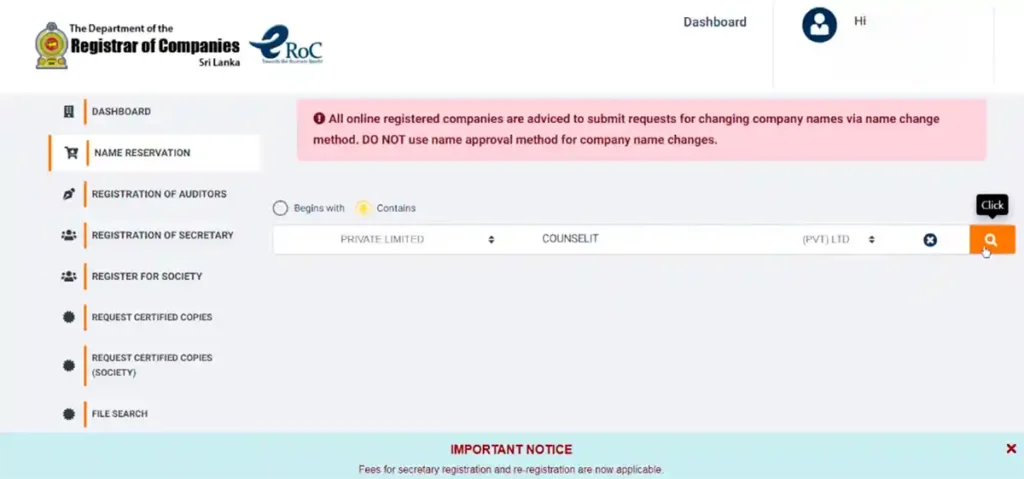
Once you click on the search icon, the system will tell you whether the name is available for reservation. If the name is available you can proceed with the application.
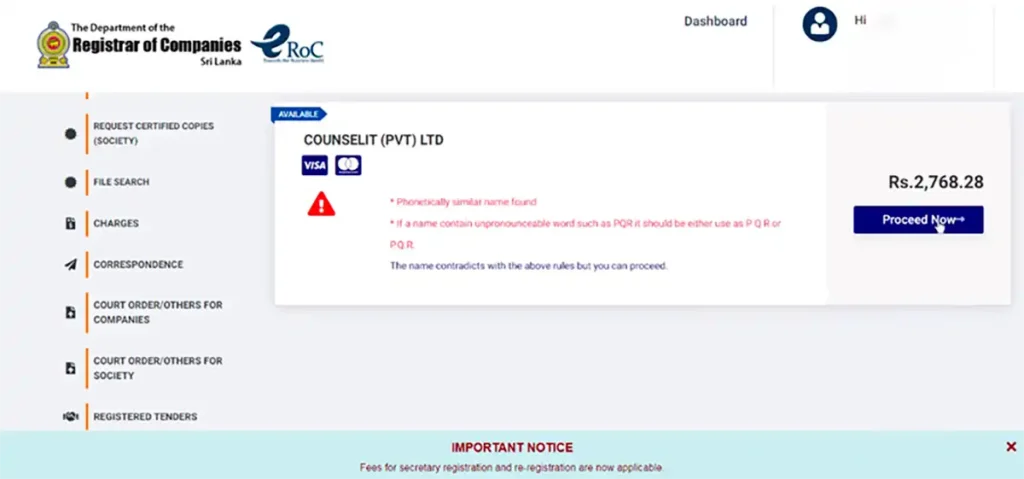
Once you proceed with name reservation, you’ll be asked to provide the name in both Sinhala and Tamil.
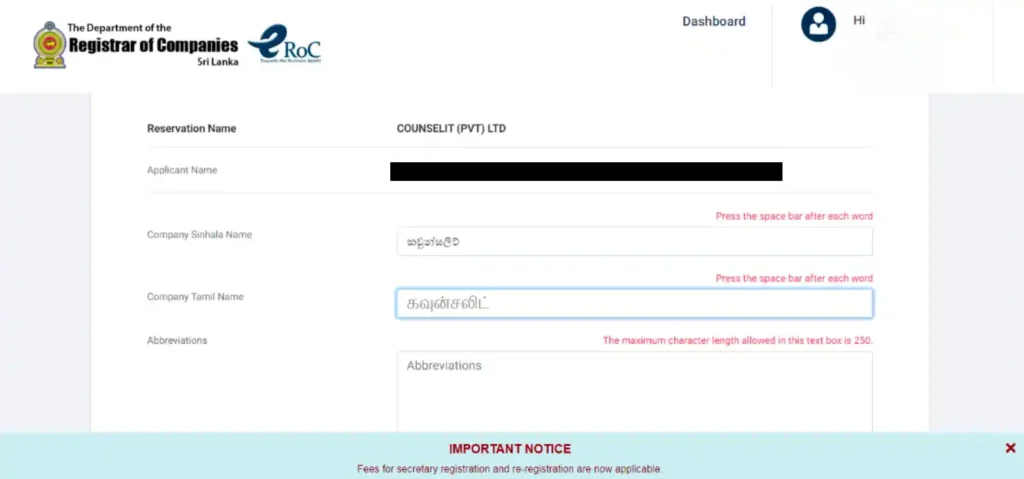
The next step is to pay the name reservation fee.
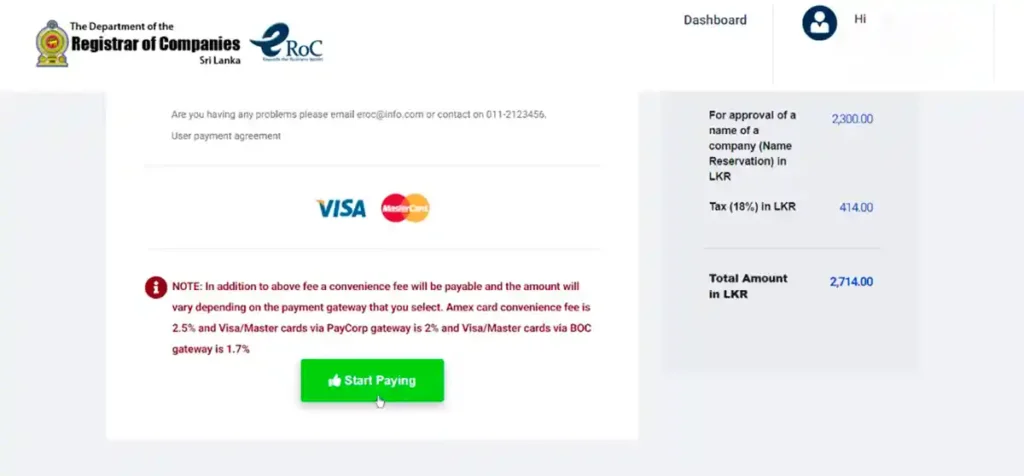
After you submit your name reservation application and complete the payment, eROC will email you the payment receipt with a summary of the name reservation application request.
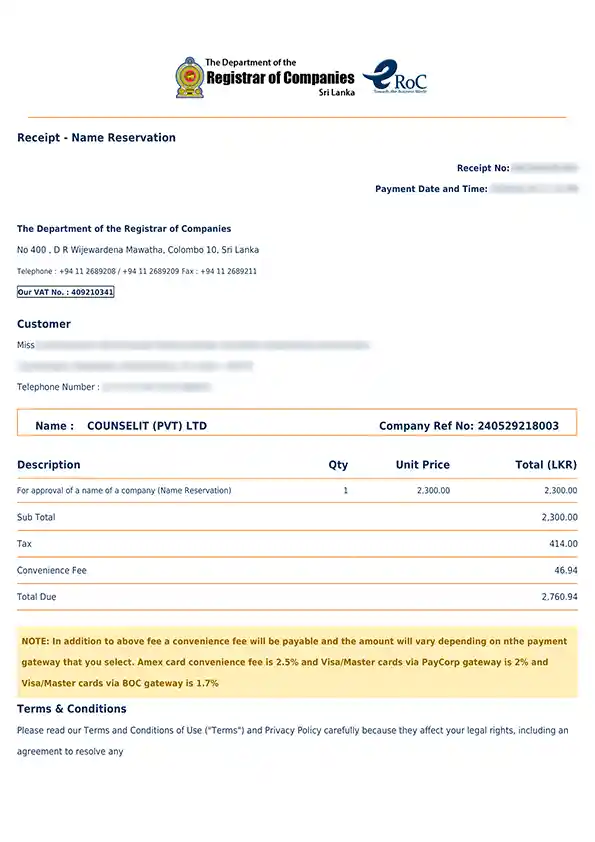
Registrar of Companies (eROC) usually responds to name reservations within 5-7 business days. If everything looks good, they’ll approve your name reservation application, and you can then begin the company incorporation process. If any changes are necessary, they’ll let you know what to modify.

3. Start Your Pvt Ltd Company Registration Online
Once you receive the email with the name reservation approval, you can go to your eROC dashboard and commence the company incorporation process.
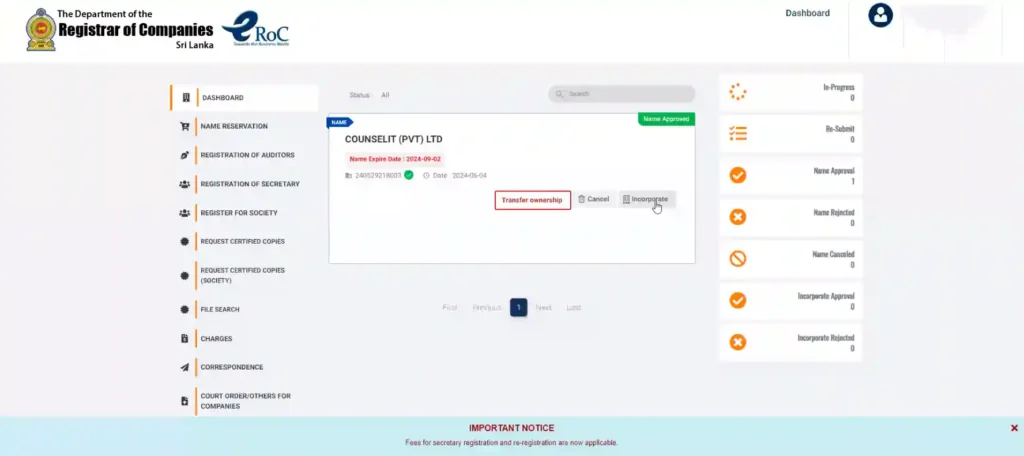
Then you’ll need to enter your company address and company objectives.
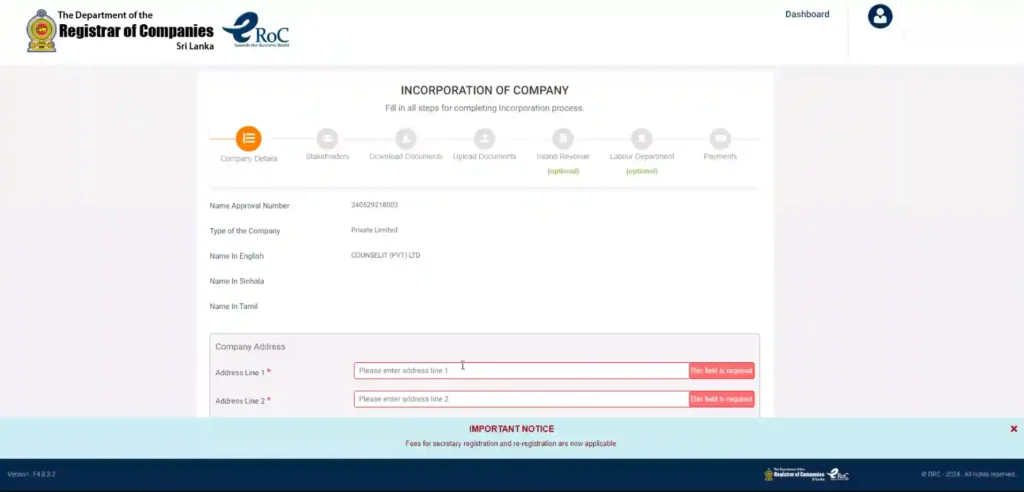
Next, you’ll need to add your company objectives.
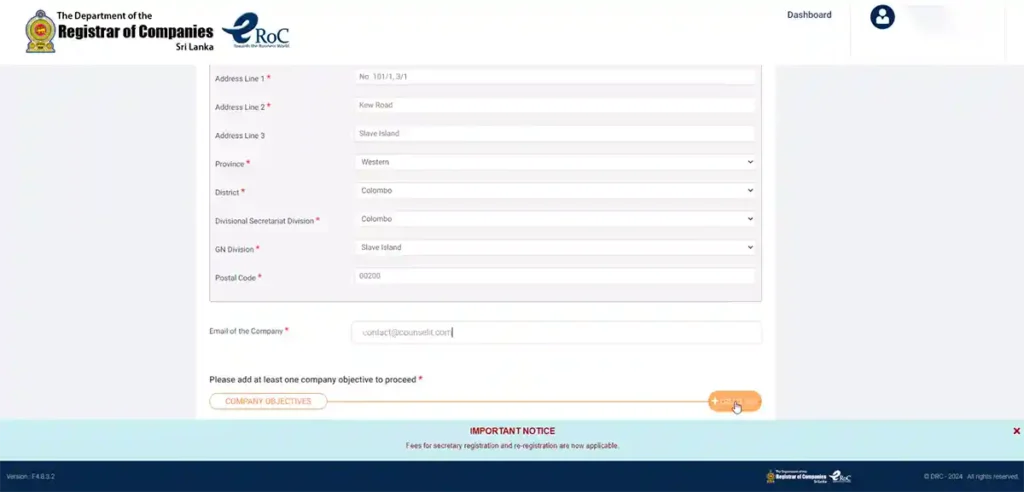

4. Fill out Pvt Ltd company registration Sri Lanka forms
You are then required to submit stakeholder details (director, secretary, and shareholder). The following information will be required.
- Title
- Name
- First name(s)
- Surname
- Date of birth
- Designation
- Local Address
- Foreign address
- Divisional Secretariat Division
- Residential phone number
- Mobile
- Date of appointment
- Occupation
- Secretary registration number (if registered secretary) Enter registration number only if he/she is a registered secretary)
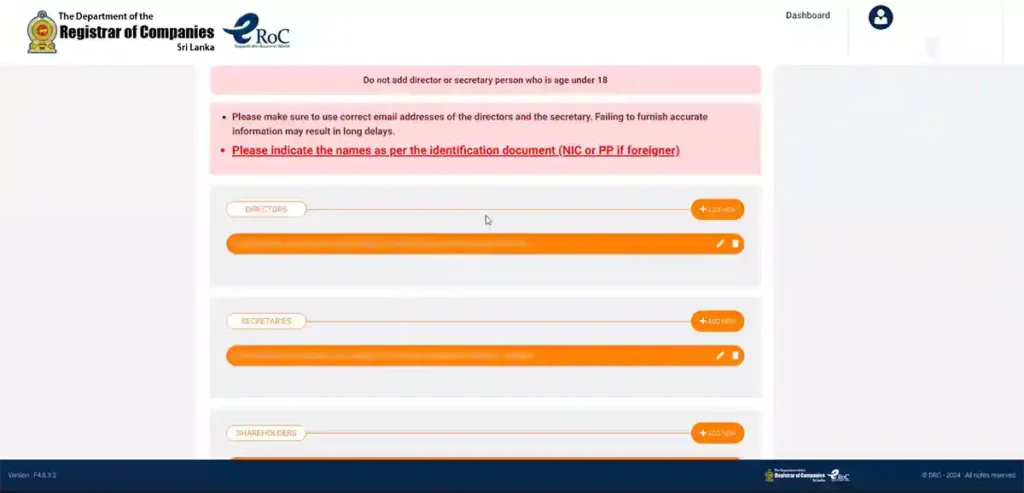
You can make director(s) as secretary and/or shareholder.
If there is only one shareholder, check the ‘Single Shareholder’ box and indicate the number of shares.
Keep in mind that when incorporating a Private Limited company, there need to be at least two natural persons who will act as director, secretary, and shareholder.
Enter the initial consideration of total shares. This is the starting share capital of your company. You do not need to submit eROC form 6 at the time of Pvt Ltd company registration. Form 6 is only needed for subsequent share issues.
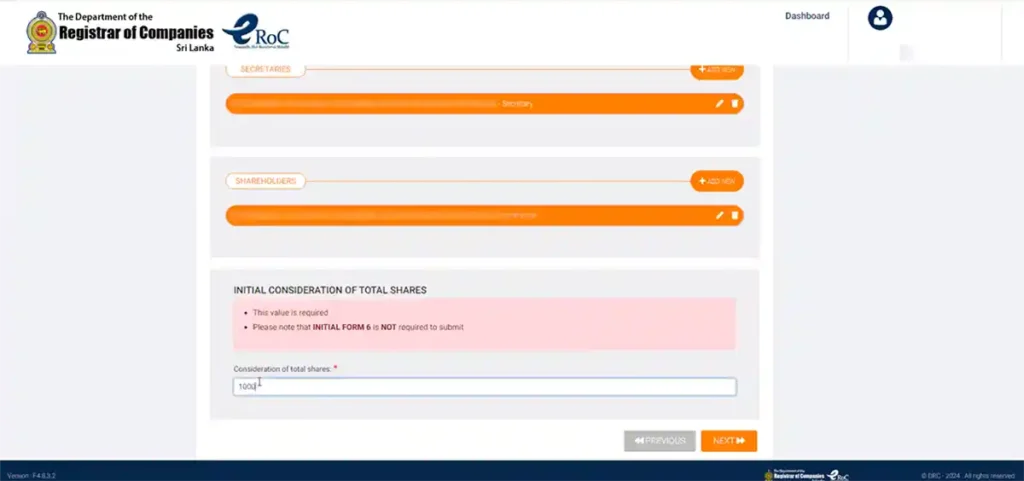
After entering stakeholder details and share capital, the system will generate eROC Forms 01 (Director Consent and Certificate) and 18 (Secretary Consent and Certificate). Download and print these forms for signatures from your company’s shareholders, directors, and secretary.
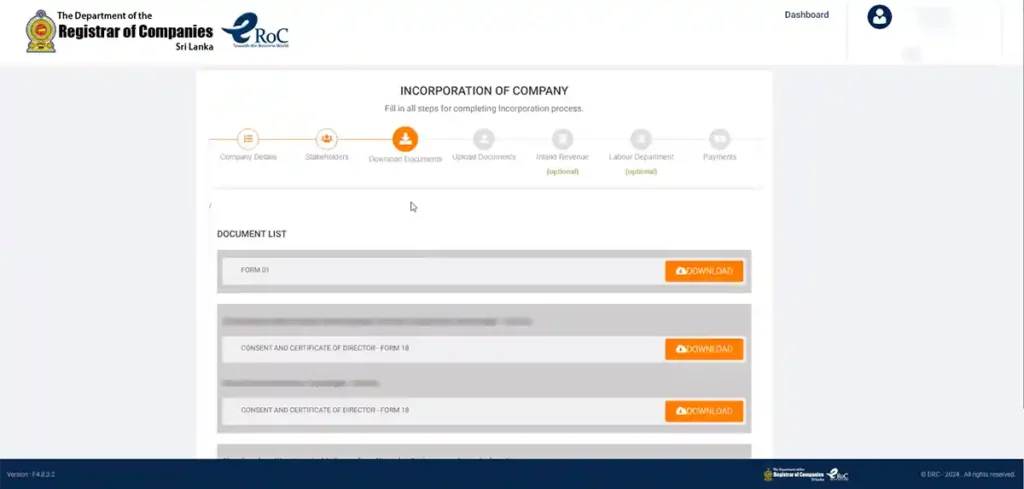
5. Draft your Articles of Association
Articles of Association is your company’s rule book. It details how your company is run internally, such as how decisions are made, how shares are issued, and the responsibilities of directors. Every Private Limited company must have an Articles of Association.
Small owner-managed Pvt Ltd companies can adopt Model Articles set out in the First Schedule to the Companies Act No. 7 of 2007. However, you have the option to customize the Model Articles to suit your company’s needs. For example, you can
- Exclude certain Model Articles.
- Modify existing Model Articles.
- Add new articles that are different from the Model Articles.
To avoid disputes down the road, you’ll want to make sure your Articles are a good fit for your company and reflect the agreements among the initial shareholders. A registered Company Secretary can help you draft and finalize the articles.
What to include in your Articles of Association?
- Shares: How shares are issued, transferred, and handled.
- Dividends: How profits are distributed to shareholders.
- Shareholder Meetings: How and when meetings are held.
- Meeting Rules: Rules for holding shareholder meetings.
- Meeting Notices: How shareholders are notified of meetings.
- Meeting Formats: How meetings are held (e.g., in person, online).
- Meeting Quorum: The minimum number of shareholders needed for a valid meeting.
- Chairperson: Who leads the shareholder meetings?
- Voting: How shareholders vote on company matters.
- Meeting Minutes: How records of meetings are kept.
- Directors: How directors are appointed and removed.
- Director Powers and Duties: What directors are responsible for.
- Managing/Executive Directors: Specific roles and responsibilities of key directors.
All shareholders must sign the Articles. At the end of the Articles, add this witness clause and have the initial shareholders sign and date it.
IN WITNESS WHERE OF I/We the initial shareholders of the proposed company having agreed to the foregoing Articles of Association have here to set their hands and subscribed their names at Colombo on this …………………Day of ……………….. Two Thousand and Twenty-Five ……/…../2025.
Here’s a sample Articles of Association for Private Limited Companies, in accordance with the Companies Act No. 07 of 2007.
6. Submit eROC forms and Articles of Association
Scan the printed eROC forms with stakeholder signatures and articles of association with shareholder signatures and then upload them to the eROC portal.
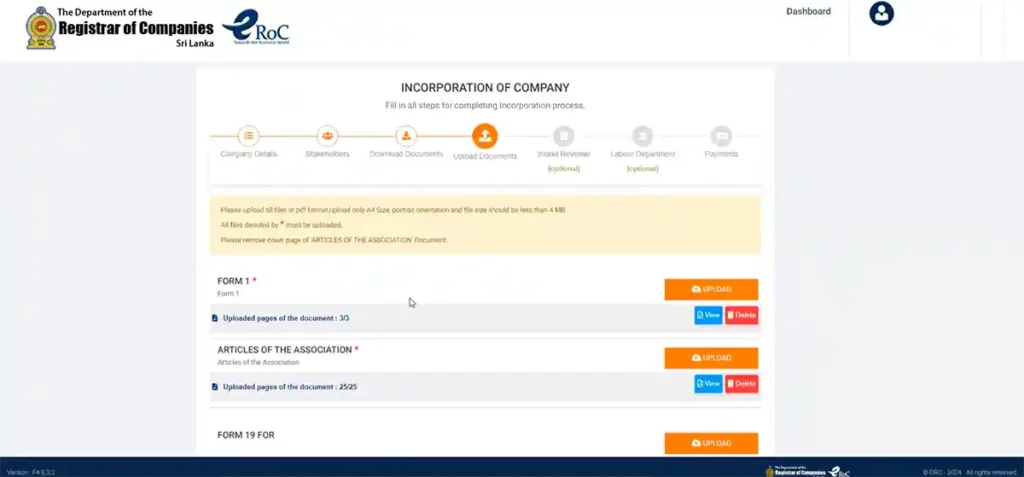
7. IRD TIN Registration online
You’ll need to register your company for income tax. For TIN registration, you’ll need to upload copies of the directors’ NICs/passports. You’ll also need to mention your company’s commencement date, select the appropriate Business Activity Code from the dropdown menu, and indicate your preferred communication method (phone, email, or mail). Finally, you’ll need to specify whether your proposed company is BOI registered and state the purpose of your tax registration.
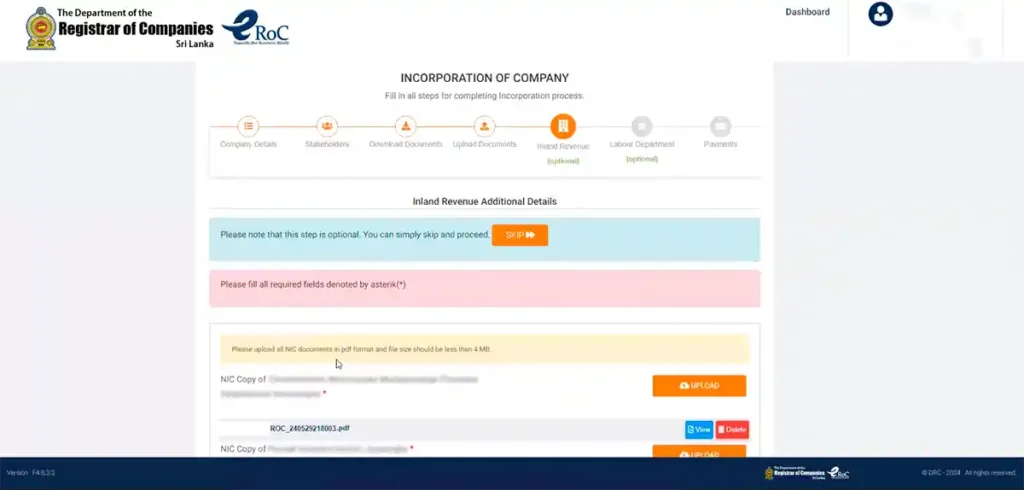
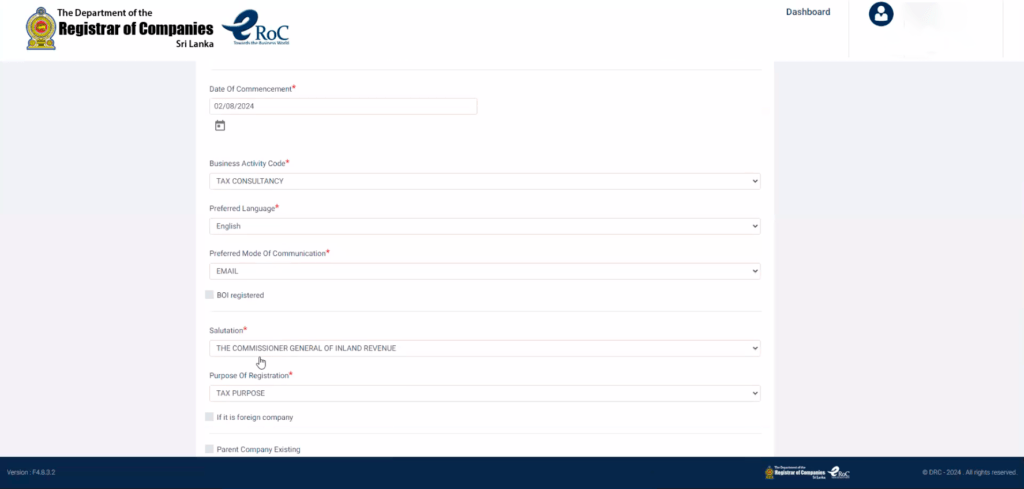
8. Registration with the Labour Department (optional)
If you have at least one employee—whether they’re permanent, temporary, an apprentice, a casual worker, or a shift worker—you’re required to register your company with the Labor Department.
Registration with the Labour Department is necessary for obtaining EPF number to handle gratuity payments, which are due to covered employees who have been with you for more than five years.
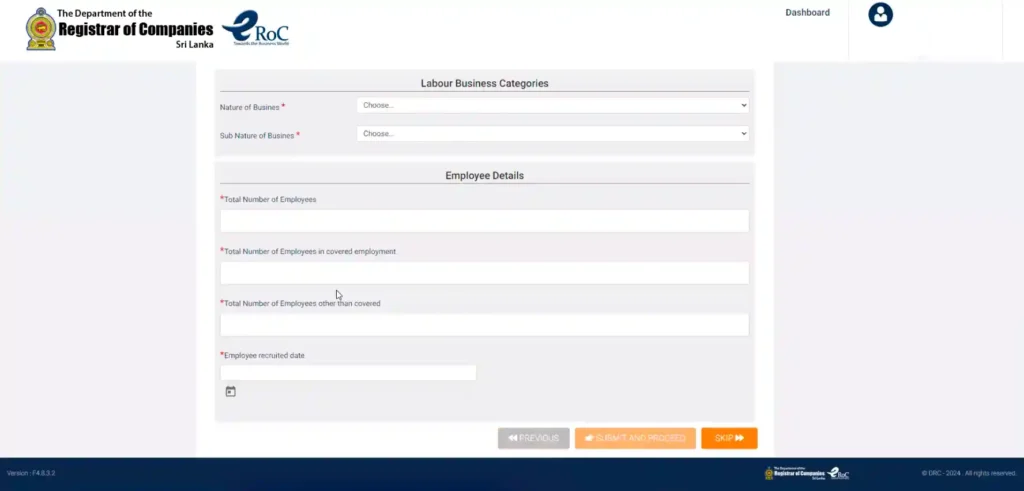
9. Pay Pvt Ltd company registration Sri Lanka fees
Registering a Pvt Ltd company in Sri Lanka costs 11,500 LKR plus VAT. The registration fee covers the Articles of Association (2,300 LKR), Form 01-application (4,600 LKR), Form 18- Consent of Director (2,300 LKR), and Form 19 – Consent of Secretary (2,300 LKR). Additionally, the name reservation application costs 2,300 LKR + VAT.
Pvt Ltd company registration Sri Lanka fee comes to a total of LKR 13,800 excluding 18% VAT.
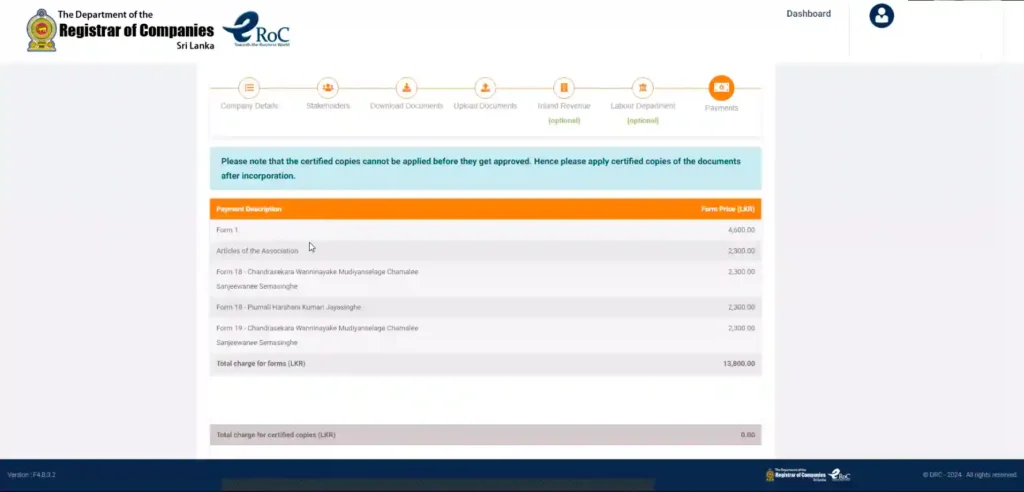
View our online company incorporation fees to understand the costs involved in Pvt Ltd company registration Sri Lanka.
After you pay the registration fee and submit your incorporation application, the eROC will email you a receipt acknowledging your submission.
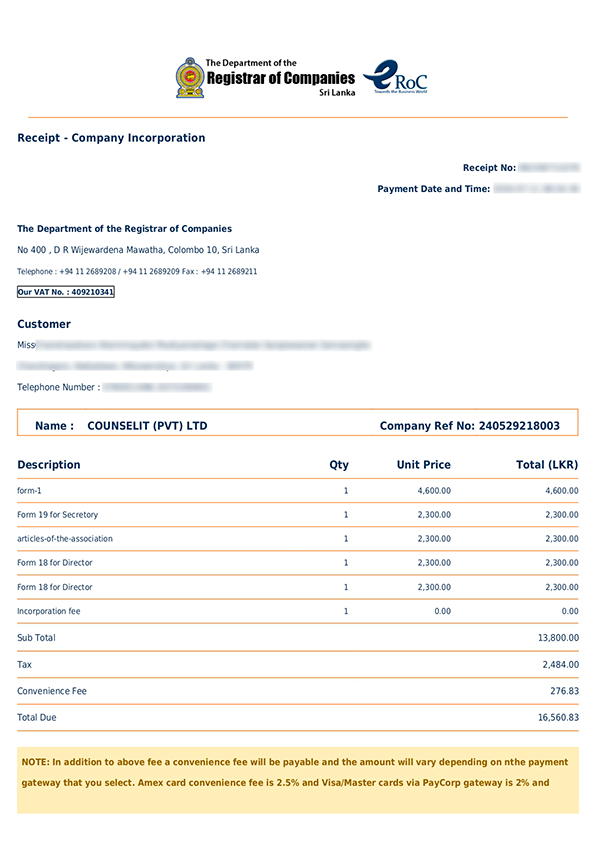
10. Collect the Company Incorporation Certificate
The Registrar of Companies usually responds to incorporation requests within 7 business days. Once incorporation is approved, eROC will email you the company incorporation certificate.
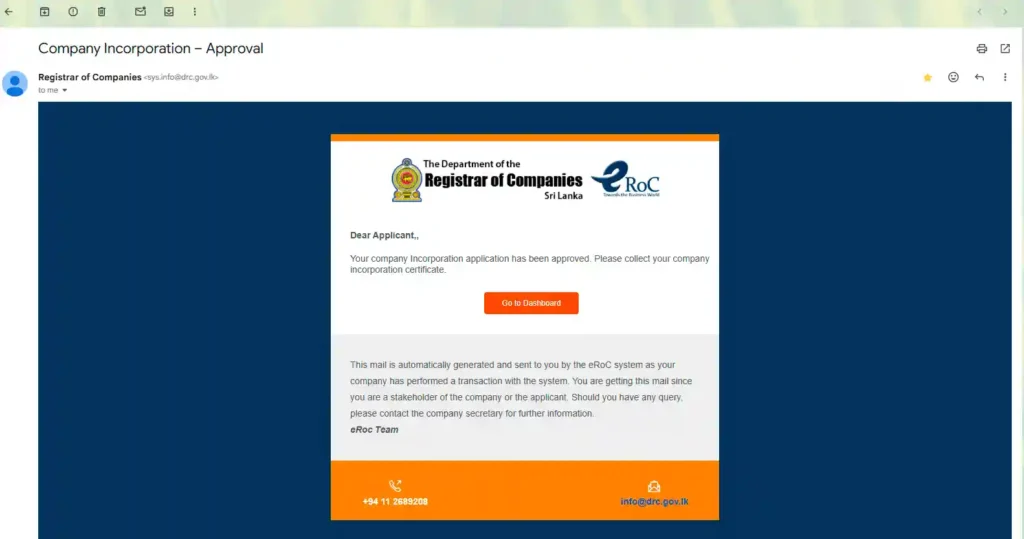
Congratulations! Your Private Limited company is officially registered with the ROC! You’re now officially in business!
Pvt Ltd Company Registration Sri Lanka FAQs
What is the full form of Pvt Ltd?
Pvt Ltd is the short form for Private Limited companies. A private limited company is a limited liability company that cannot shares to the public but when all shares are owned by a single person or less than 50 shareholders. When registering a Pvt Ltd company you have the option to use the suffix Pvt Ltd or its long form private limited.
What is an example of a private limited company?
Private limited companies are those companies where shareholders’ liability is limited to the shares they own. These companies are also prohibited from offering shares to the public. An example of a private limited company in Sri Lanka is Abans Environmental Services (PVT) Ltd and Asia Securities (PVT) Ltd.
In Sri Lanka, what’s the difference between a “Limited Company” and a “(Private) Limited Company”?
In Sri Lanka, the term “Limited Liability Company” (LLC) isn’t used. Under the Companies Act No. 7 of 2007, there are three types of limited liability companies. One of them is the Private Limited Company (Pvt Ltd). The other two are Public Limited Companies and Companies Limited by Guarantee.
What is the difference between an unlisted public limited company and a private limited company?
The main difference between an unlisted public limited company and a private limited company is its ownership structure and how shares can be transferred. An unlisted public limited company can have unlimited number of memebers. Its shares can be transferred freely, but they’re not listed on a stock exchange. On the other hand, a private limited company is limited to 50 shareholders. Shares can’t be easily transferred. Private companies can’t offer shares to the public, so they cannot be listed on a stock exchange.
What is the difference between sole proprietorship and Pvt Ltd?
The fundamental difference between sole proprietorship and Pvt Ltd company is the limited liability protection. Sole proprietorship is owned and controlled by a single person who bears unlimited liability for business debts. Pvt Ltd companies are owned by shareholders whose liability is restricted to the amount of shares they own.
How to convert a sole proprietorship to a private limited company in Sri Lanka?
To convert a sole proprietorship to a private limited company, simply check whether your existing business name or proposed company name is available in the eROC database and then submit the required eROC forms to register a private limited company with the Registrar of Companies of Sri Lanka.
What are the benefits of a private limited company?
A key advantage of a private limited company over a sole trader or partnership is limited liability protection. Your personal assets are protected from your company’s creditors if the company becomes insolvent. It’s also easier to attract investment and raise capital with more shareholders. Registering a private company definitely makes your business look more credible and professional to your customers.
Who owns a private company?
Shares in a private limited company are owned by its shareholders. Anyone who purchases shares, even just one share, becomes a shareholder and has an ownership interest in the company.
Is a company owned by one person?
According to Companies Act No.7 of 2007, one or more persons can own a private limited company. The maximum number of shareholders in a private limited company is 50. The minimum is one.
Who controls a private limited company?
A private limited company is managed by a board of directors. Every company needs at least one director, who can also be the sole shareholder. This means you can have both 100% ownership and full control of your company
Can a private limited company issue shares?
A private limited company can issue shares to a select group of investors, which often includes friends, family, and associates. However, these companies are prohibited from offering shares to the public through a stock exchange or other public offering.
Who is more powerful, a director or a shareholder?
Directors are responsible for the day-to-day management and decision-making of the company. However, shareholders have the final say and can often remove any director with a simple majority vote.
Who owns the assets of a private limited company?
A company is a separate legal entity from its shareholders. This means the assets of a private limited company are owned by the company itself. The shareholders and directors do not personally own the company’s assets—they belong to the company as a distinct legal entity.
How many shares can a company have?
A private limited company can issue as many shares as it wants unless the articles of association specify a limit. There’s no set cap on the minimum or maximum number of shares a company is required to issue.
What is the minimum number of shareholders in a private limited company?
A private limited company can have just one shareholder. The minimum number of shareholders is typically one.
What happens when you own 1 share in a company?
Owning even one share means you own a small portion of the company. As a shareholder, you get voting rights, dividends, and limited liability. However, with just one share, your voting power and influence on the company’s decision will likely be minimal.
What is form 6 in Sri Lanka?
The initial shareholders of a company are listed in FORM 1. For subsequent share issues, the company must submit Form 6 signed by the director and company secretary, along with an extract of the board resolution to the Registrar of Companies (RoC).
This notice should be submitted within 20 working days of the share issuance. It must include the date of issue, the number of shares issued, the consideration for which they were issued, the full names and addresses of the shareholders, their NIC or Passport numbers, a copy of the terms of issue, and the company’s stated capital before and after the issue.
How to issue shares in a private company in Sri Lanka?
To issue shares in a private limited company in Sri Lanka, the Board of Directors must first determine the value of the shares to be issued and decide the consideration for the shares, which can be in cash, promissory notes, services, property, or other securities.
After issuing shares, the company must submit Form 6 and an extract of the Board resolution to the Registrar of Companies (RoC) within 20 working days. A share certificate must be issued to shareholders as proof of ownership.
How to sell shares in a private limited company?
To sell shares in a private limited company, the shareholder must follow the rules for the issue of shares outlined in the company’s Articles of Association. The Articles often grant existing shareholders a right of first refusal. This means they have the first option to purchase the shares at the agreed-upon price. If the existing shareholders do not exercise this right, the selling shareholder can then offer the shares to a third party.
The sale must be approved by the Board of Directors, and the transfer of shares is formalized by updating the company’s register of members. A share certificate is usually issued to the new shareholder as evidence of their ownership.
How many directors are in a private limited company?
A private limited company in Sri Lanka must have at least one director. The maximum number of directors can vary from company to company, as the company’s Articles of Association typically set the upper limit.
Who is eligible for director?
According to the Companies Act, 2007, the following people are eligible to be appointed as directors of a private limited company:
1. Any person who is 18 years or older.
2. A person who is not an undischarged insolvent.
3. A person who is not prohibited by law from being a director under specific sections (213 or 214) of the Act.
4. A person who has not been adjudged to be of unsound mind.
5. A natural person (i.e., an individual, not a company).
6. A person who meets any additional qualifications specified in the company’s Articles of Association.
Additionally, the person must consent and certify in Form 18 (Notice of Consent and Certificate of Director) that they are not disqualified from holding that office.
Who Cannot be a director?
A person cannot be a director of a company in Sri Lanka if they:
1. Have been convicted of an offense under the Companies Act punishable by imprisonment.
2. Have been convicted of a dishonest or fraudulent offense.
3. Are adjudged insolvent under the Insolvency Ordinance.
4. Are adjudged to be of unsound mind.
5. Are prohibited by the court due to non-compliance with the Companies Act, previous dishonest conduct, or involvement in an insolvent company.
These individuals can apply to the court for permission to become a director, but they must wait for a period of five years (or up to ten years in some cases).
Who appoints director?
Shareholders in a private limited company appoint the directors, usually at a shareholders’ meeting through a written resolution. Sometimes, a director can appoint an alternate director to act in their place, depending on what the Articles say.
What is the difference between a CEO and a director of a company?
The CEO is responsible for setting the strategic vision and overall direction of the company. Directors focus on the company’s day-to-day management and operations. The directors are accountable to the company’s shareholders and report to them on the company’s performance.
Can a company have 2 directors?
A private limited company in Sri Lanka is required to have at least one director, but it can have two or more directors.
Can the CEO be a director?
Yes, the CEO can also be a director of a private limited company. In many cases, especially in smaller companies, the CEO is also a member of the board of directors.
Can a director be a shareholder?
Yes, a director can also be a shareholder in a company. In private limited companies, it is quite common for directors to hold shares.
How do I remove a director from a company in Sri Lanka?
To remove a director, shareholders need to pass an ordinary resolution at a shareholders’ meeting specifically called for this purpose. The meeting notice must clearly state that the removal of the director is on the agenda. If the director wants, they can submit a written statement within 14 days of the notice, which the company must send to all shareholders. If the company fails to do so, the director can ask for their statement to be read at the meeting. If the resolution passes with a simple majority vote, the director is officially removed from the position.
What is Form 20 in a company in Sri Lanka?
Form 20 is the eROC form used to update the Registrar of Companies when there are changes to a director or secretary, or their details. Companies must submit this form within 20 days of making any changes.
What is form 15 in Sri Lanka?
Form 15 in Sri Lanka is the eROC form used to submit the Annual Return to the Registrar of Companies (ROC). The First Annual Return must be filed within 18 months of the Pvt Ltd company registration, and thereafter, it must be filed annually.
The company must hold an AGM at least 14 days before filing the Annual Return. If the AGM can’t be held, directors must agree to waive it and pass necessary resolutions, submitting these with Form 15. Failure to comply with the AGM requirement can result in fines of up to Rs. 100,000 for the company and up to Rs. 50,000 for officers in default.
Register Your Private Limited Company in Sri Lanka with Counselit
If you’re ready to take the next step with your business and register a Private Limited company in Sri Lanka, Counselit can assist you. As registered Company Secretaries, we’re well-equipped to guide you through each step of the Pvt Ltd company registration process. If you need incorporation assistance or clarify any questions you may have about how to register pvt ltd company in Sri Lanka, feel free to contact us at +94760011066, email contact@counselit.com, or schedule a free 30-minute consultation online.





